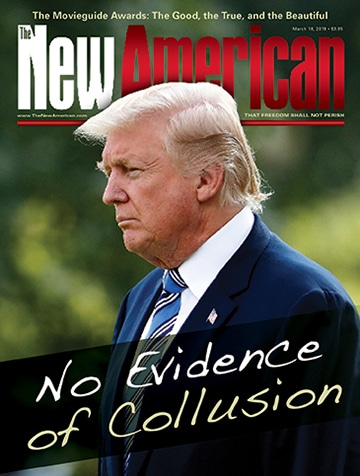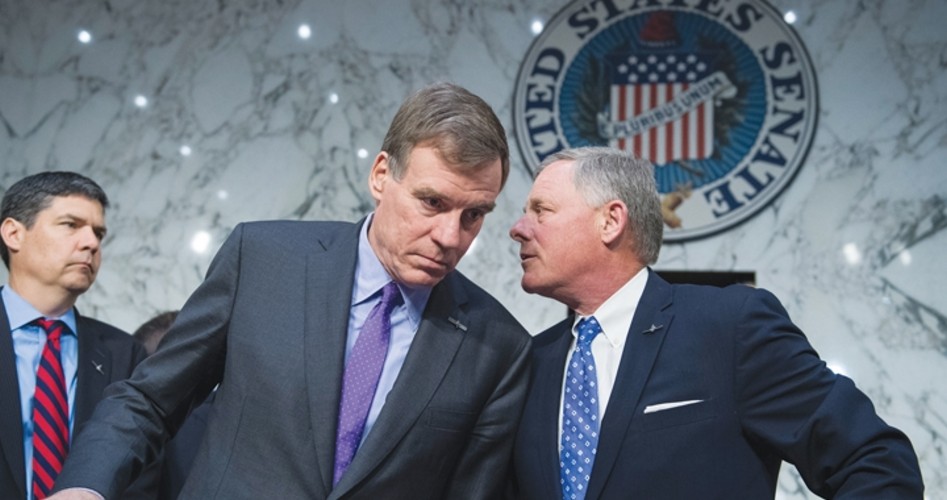No Evidence of Collusion
After two years of leaving no stone (real or imaginary) unturned in its investigation, the Senate Intelligence Committee is in the final stages of its Trump/Russia collusion investigation and winding down to a conclusion. And similar to the House Intelligence Committee — which ended its investigation last year — the Senate Intelligence Committee did not find “anything that would suggest there was collusion by the Trump campaign and Russia,” according to Senator Richard Burr (R-N.C.), chairman of the committee.
Burr’s concise and articulate comment was made during an interview with CBS News for an article that was published online the first week of February. In that interview, Burr could not have been more clear or less ambiguous: “If we write a report based upon the facts that we have, then we don’t have anything that would suggest there was collusion by the Trump campaign and Russia.”
That statement — hinting that the committee may release its report in coming weeks or months — comes after two years during which the committee interviewed more than 200 witnesses and reviewed more than 300,000 pages of documents. Given the depth and breadth of the investigation and lengths to which investigators went, it seems clear that if there were evidence of collusion, it would have been uncovered. Instead, as Burr’s comment makes clear, no such evidence has come to light. The week after his interview with CBS News, Burr broke it down into even smaller pieces for people who may have mistaken his previous statement, telling NBC News for an online article, “There is no factual evidence of collusion between the Trump campaign and Russia.”
There is no honest way to interpret that other than to conclude that after two years, 300,000 pages, and 200 interviews, the committee has found nothing that shows collusion between the Trump campaign and Russia.
Democrats Cling to the Narrative
Not surprisingly, Democrats pretend otherwise, while hoping against hope that something — anything — will come out that they can use to prop up the failing narrative of Trump/Russia collusion.
Vice Chairman of the Senate Intelligence Committee Mark Warner (D-Va.) was quick to muddy the waters with baseless and unfounded accusations, claiming that “there’s never been a campaign in American history ... that people affiliated with the campaign had as many ties with Russia as the Trump campaign did.” It seems Warner is pretending not to be aware of the campaign of his good friend Hillary Clinton — going all the way back to Clinton’s tenure as secretary of state. (See the sidebar on page 12.)
And while Warner told reporters on February 12 that he disagrees with Burr’s characterization of the evidence, he refused to offer any rebuttal, saying, “I’m not going to get into any conclusions I have.” Warner’s silence on the subject is deafening — especially coming on the heels of saying he disagrees with Burr’s summary. One is left to ask: If Warner had some concrete reason for his disagreeing, wouldn’t he say so?
Warner is not the only Democrat to downplay Burr’s remarks, but even the others quoted in the NBC News article stopped short of disputing Burr’s characterization that there is no evidence “that would suggest there was collusion by the Trump campaign and Russia.” The NBC News article stated that “Democratic Senate investigators who spoke to NBC News on condition of anonymity did not dispute Burr’s characterizations, but said they lacked context.”
But those Democratic Senate investigators did not fill in the context they claim is lacking — opting instead to grasp at straws and cast aspersions. One Democratic aide is quoted as opining, “We were never going to find a contract signed in blood saying, ‘Hey Vlad, we’re going to collude.’” As if that is all that’s missing here.
And trotting out tired, old lines from the past two years, one Democratic Senate investigator said, “Donald Trump, Jr. made clear in his messages that he was willing to accept help from the Russians,” adding, “Trump publicly urged the Russians to find Clinton’s missing emails.”
Of course, far from providing missing “context,” both of those episodes are well known and would certainly have been part of the “evidence” considered by the committee. That means, of course, that they are taken into context in Burr’s assertion that the committee saw no evidence “that would suggest there was collusion by the Trump campaign and Russia.”
To put in the for-what-it’s-worth column, both of those claims are bogus.
First, Donald Trump, Jr.’s willingness to “accept help from the Russians” was not — by any honest person’s definition — anything like collusion; it was opposition research. He believed he had an opportunity to get information on Clinton that would hurt her campaign. Furthermore, the phrase “from the Russians” is ambiguous and misleading — likely deliberately so. Don, Jr.’s meeting was not with a Russian official, but with Russian lawyer Natalia Veselnitskaya, a private Russian citizen who claimed she had information damaging to Clinton. This is not the smoking gun proponents of the collusion narrative like to pretend it is. In fact, opposition research is a normal part of politics, like it or not.
As for Trump having “publicly urged the Russians to find Clinton’s missing emails,” this is less of an issue than Don, Jr.’s meeting with Veselnitskaya for two related reasons. First, it was not a serious request for digital intel from a foreign power, but a politically expedient sound bite intended to gain points at a press conference. Because far from the way it has been portrayed in the liberal mainstream media, what Trump actually said cannot honestly be interpreted as “Trump publicly urg[ing] the Russians to find Clinton’s missing emails.” What Trump actually said on July 27, 2016 — after publicly denying for the umpteenth time that he has any ties to Russia — was:
Photo credit: AP Images
This article appears in the March 18, 2019, issue of The New American.


